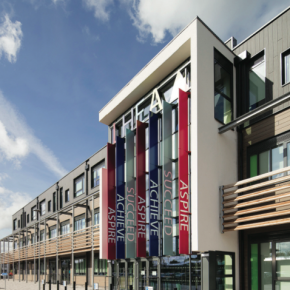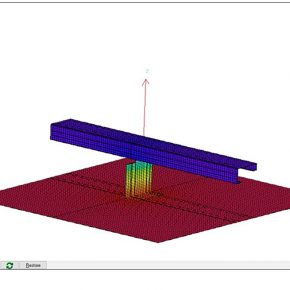
An education in offsite construction
Raymond Millar, construction director of offsite specialist, The McAvoy Group, looks at the design and construction of a new, state-of-the-art academy in Slough and how it was delivered weeks ahead of programme, in the latest issue of PSB magazine.
Lynch Hill Enterprise Academy is a £20m education campus and one of the largest ever modular schools to be built in the UK. It demonstrates a number of new developments which contributed to its early completion – an unprecedented 17 weeks ahead of programme, giving this new, free school the benefit of even earlier occupation.
Lynch Hill is a 1,140-place academy specialising in science, technology, engineering and maths, and was built by principal contractor and offsite specialist, The McAvoy Group. The project has already been shortlisted for five industry awards.
Funded by the Education and Skills Funding Agency (ESFA), the three-storey 8,750m2 building is an exemplar offsite education project which has a design inspired by the world-leading Harvard Business School.
Pre-construction challenges
The design for Lynch Hill was initially developed for another site and then had to be adapted for a second and final brownfield site. The build programme had to accommodate extensive demolition works, asbestos removal, the adjacent construction of a new sports stadium, restricted access and the school’s first intake of pupils who were located in temporary buildings also on the site.
Construction had to be phased to allow early handover of the sports hall and changing facilities for use by the school.
Design criteria
The design brief set out a number of important criteria, all within the ESFA’s available budget, which the project successfully met.
It had to facilitate the exchange of knowledge with business and encourage a sense of enterprise among students, thereby helping to bridge the skills gap for local companies.
It had to create an environment for collaborative learning and mentoring, and provide good visibility as part of the school’s anti-bullying strategy.
It also had to have excellent acoustic performance and community access was required to the sports facilities.
Encouraging collaborative learning
The school is designed around four large, multi-functional central spaces which help to maximise natural light and encourage interaction. An enterprise exchange runs through the core of the building on two levels to facilitate collaboration with local businesses.
The use of inspirational messages and bold colours reflects the academy’s ethos of enterprise, aspiration and achievement.
The building features an impressive full-height glazed entrance, a striking timber colonnade with brise soleil sunshading and a palette of materials which includes render and timber-effect rainscreen cladding to harmonise the scheme in its semi-rural location.
Outstanding education facilities
Offsite construction was used for the curriculum wing. Facilities include science laboratories, ICT suite, SEN hub, studios for music, drama and art, areas for informal learning, sixth form study and social space, kitchen and café.
Externally, there is a landscaped area and social space which form a large arrival plaza at the front of the school. This creates a sense of place and identity for the academy and encourages informal gatherings with its planting and seating. There are outdoor teaching spaces, a soft landscaped study garden, social area, multi-use games areas and a sports pitch.
New developments in offsite construction
 Lynch Hill demonstrates a number of technical advancements in offsite technology. Larger 15.6m long modules and a new lifting system were specially engineered by McAvoy for the project which reduced time, transport and installation costs and further improved construction efficiency. Some of the steel-framed modules were pre-clad offsite in the factory to further reduce time on site.
Lynch Hill demonstrates a number of technical advancements in offsite technology. Larger 15.6m long modules and a new lifting system were specially engineered by McAvoy for the project which reduced time, transport and installation costs and further improved construction efficiency. Some of the steel-framed modules were pre-clad offsite in the factory to further reduce time on site.
The use of a McAvoy offsite solution removed the need for storage of large volumes of building materials on the site, helping to address the issue of restricted access.
Around 65% of the building’s construction was completed offsite. 146 modules were installed with doors, windows, ironmongery, internal walls, plumbing, electrics and joinery already in place. This approach reduced the build programme to just 53 weeks – around six months less compared to site-based construction for a school of this scale.
The client perspective
Phil Clarke, ESFA project manager, said: “The main driver for offsite for this project was speed – and to see a building of this scale constructed so quickly was amazing. The McAvoy construction team demonstrated a high level of skill and flexibility.
“The combination of steel-framed construction and the offsite solution works really well and is seamless. You would never know this was a modular build. It is an outstanding secondary school scheme.”
Gillian Coffey, executive headteacher at Lynch Hill said: “This new academy has been developed to address a severe shortfall in school places in Slough. The facilities are terrific and the children are enjoying a fantastic new learning environment and the benefits of cutting-edge design. The building works very well to optimise the space, to provide excellent acoustic performance and high levels of natural light, and to futureproof the needs of the children.
“The speed of offsite construction was the biggest benefit of the approach on this project. To build a school of this scale, using state-of-the-art design, within a year is amazing.
“McAvoy worked extremely hard to deliver the building and we had a very positive relationship with the project team throughout.
We would recommend the design and the process to any school looking for a building solution that delivers both speed and this quality of learning environment.”
Lynch Hill takes the use of offsite for secondary schools to a new level and has exceeded this academy’s expectations for speed, quality and design.
Latest news

26th July 2024
Enfield Speciality Doors completes world-class project for Atlas Copco HQ
A rundown office and warehouse building completely transformed into a modern headquarters for Atlas Copco has been fitted with more than 120 internal fire doors from Enfield Speciality Doors.
Posted in Access Control & Door Entry Systems, Articles, Building Industry News, Building Products & Structures, Building Systems, Case Studies, Doors, Interior Design & Construction, Interiors, Posts, Restoration & Refurbishment, Retrofit & Renovation, Security and Fire Protection, Sustainability & Energy Efficiency, Timber Buildings and Timber Products, Wooden products
26th July 2024
Abloy UK launches new white paper
Abloy UK, a leading provider of security and access control solutions, has launched a new white paper.
Posted in Access Control & Door Entry Systems, Architectural Ironmongery, Articles, Building Industry News, Building Products & Structures, Building Services, Doors, Facility Management & Building Services, Health & Safety, Information Technology, Innovations & New Products, Publications, Research & Materials Testing, Security and Fire Protection
26th July 2024
MCRMA Member Profile: David Roy, Director of Roofconsult
David Roy of MCRMA member company Roofconsult has more than 50 years’ experience to draw upon working in the building envelope sector and a unique perspective on how it has changed in that time.
Posted in Articles, BIM, Infrastructure & CAD Software, Building Associations & Institutes, Building Industry News, Building Products & Structures, Building Services, Building Systems, Cladding, Information Technology, Restoration & Refurbishment, Retrofit & Renovation, Roofs, Walls
26th July 2024
Strand: Enhancing Door Functionality and Safety
Craig Fox, Sales Director for Strand Hardware, outlines how door industry professionals might apply door limiting stays…
Posted in Architectural Ironmongery, Articles, Building Industry News, Building Products & Structures, Building Services, Doors, Facility Management & Building Services, Health & Safety, Restoration & Refurbishment, Retrofit & Renovation
 Sign up:
Sign up: